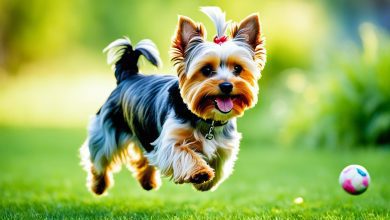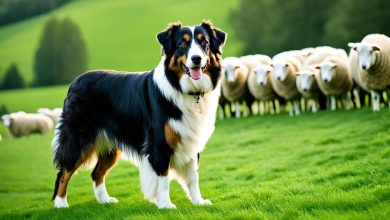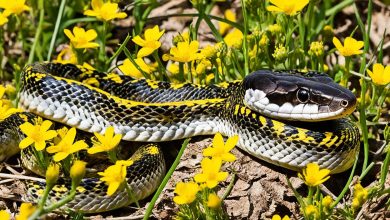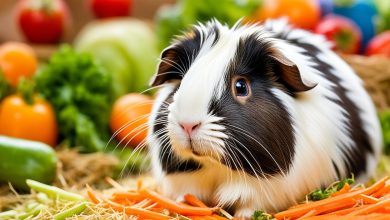I’m thrilled to explore the world of the Bordoodle, a designer dog breed that has won over many hearts. These dogs are a mix of the Border Collie and Poodle, offering a unique set of traits. They are intelligent, energetic, and perfect for families and active individuals.
Bordoodles are celebrated for their loyalty and high energy. They are ideal for various activities like hiking, hunting, beach trips, and playtime. Their intelligence and trainability make them excel in obedience, agility, and service roles. This versatility makes them a great addition to any home.
If you’re thinking of getting a Bordoodle or just want to learn more, this guide is for you. We’ll cover their origins, appearance, temperament, and care needs. By the end, you’ll see why Bordoodles are so popular among dog lovers.
What is a Bordoodle?
The Bordoodle is a captivating mixed breed, blending the best qualities of the Border Collie and Poodle. These intelligent crossbreeds are known for their friendly, high-energy personalities. They make excellent companions due to their dynamic nature.
Bordoodles are a relatively new designer dog breed, combining the herding instincts of the Border Collie with the poodle’s curly, low-shedding coat. This unique mix results in a loyal, playful, and affectionate canine. They thrive in active households.
A Versatile Hybrid Breed
Bordoodles come in a variety of sizes, ranging from 20 to 80 pounds, with the most common weight being between 35 and 45 pounds. Their height can vary from 15 to 26 inches, with the average being around 18 to 22 inches tall.
One of the standout features of the Bordoodle is their life expectancy, which typically ranges from 12 to 16 years. This is a testament to the hybrid vigor that often comes with mixed-breed dogs. They tend to have fewer health issues compared to their purebred counterparts.
Bordoodles are recognized by several registries, including the American Canine Hybrid Club, Designer Breed Registry, and International Designer Canine Registry, though they are not yet acknowledged by the American Kennel Club (AKC). This growing popularity has led to the emergence of a small but dedicated community of Bordoodle breeders. They ensure the continued development and availability of this captivating designer breed.
Origins of the Bordoodle
The Bordoodle is a relatively new designer dog breed, emerging in the early 2000s in the United States. It’s a hybrid, born from the union of a Border Collie and a Poodle. This blend combines the intelligence and versatility of both breeds into one.
The Border Collie boasts a rich history, dating back to the 19th century. Hailing from the Scotland-England border, it was bred for herding sheep and other livestock. In contrast, the Poodle’s lineage stretches back to the 15th-16th century in France and Germany. Initially, it was a hunting dog.
Over the years, the Bordoodle has become increasingly popular as a designer dog breed. Its origins may be unclear, but its reputation for being friendly, energetic, and highly trainable has made it a favorite among dog lovers.
| Breed | Origin | History |
|---|---|---|
| Border Collie | Scotland-England border region | Developed in the 19th century for herding sheep and other livestock |
| Poodle | France and Germany | Originated in the 15th-16th century as a hunting dog |
| Bordoodle | United States and Australia | Emerged as a designer dog breed in the early 2000s |
“The Bordoodle is a unique blend of the Border Collie’s herding instincts and the Poodle’s intelligence, creating a highly trainable and affectionate companion dog.”
Bordoodle
Bordoodles are a delightful mixed-breed dog that combines the best traits of the Border Collie and Poodle. These dogs are energetic, intelligent, and affectionate. They come in various sizes, coat types, and colors, depending on their parents. Their teddy bear-like appearance and playful personalities are sure to win your heart.
Male Bordoodles typically weigh between 50 and 60 pounds and stand about 22 inches tall at the shoulder. Females are slightly smaller, weighing 30 to 40 pounds and standing around 20 inches tall. Their coats can be curly, wavy, or slightly more straightforward, featuring a range of colors including red, blue, and brown.
Besides their size differences, Bordoodles are known for their irresistible, fluffy appearance. Their medium-length, curly coats give them a cuddly, teddy bear-like look. Whether you prefer the larger or smaller Bordoodles, these pups will surely capture your heart.
The bordoodle breed characteristics are versatile in size and appearance. This diversity means prospective owners can find the perfect Bordoodle for their lifestyle and preferences. Whether you want a larger, active companion or a smaller, lap-friendly pet, there’s a Bordoodle for you. All Bordoodles are highly intelligent and eager to please, making them highly trainable and adaptable to various living situations.
In summary, the bordoodle appearance and bordoodle size are unique and captivating. There’s a wide range of options to suit any dog lover’s preferences. These remarkable canines will bring joy, companionship, and endless entertainment to their owners.
Appearance and Size
Bordoodles are a unique and visually appealing designer dog breed. They come in various sizes, coat types, and colors. Their appearance is shaped by the genetics of their Border Collie and Poodle parents.
Bordoodle Size
Bordoodles span from small to medium in size, depending on the Poodle parent. Standard Bordoodles weigh over 18 kg (40 lbs) and reach 50-55 cm (20-22 inches) in height at the shoulder. Miniature Bordoodles weigh between 12-18 kg (26-40 lbs) and stand about 45 cm (18 inches) tall. Toy Bordoodles are the smallest, weighing less than 12 kg (26 lbs) and standing under 45 cm (18 inches) tall.
Bordoodle Coat and Colors
Bordoodles often have a curly or wavy coat, giving them a soft, teddy bear-like look. Their coats can be black, white, brown, or fawn, and may feature bicolor or tricolor patterns. Coat type and color depend on the Poodle genetics. For instance, F1B Bordoodles, being 75% Poodle, are more hypoallergenic and shed less.
| Bordoodle Trait | Characteristics |
|---|---|
| Size | Standard Bordoodle: 50-55 cm (20-22 inches) tall, over 18 kg (40 lbs) Miniature Bordoodle: Around 45 cm (18 inches) tall, 12-18 kg (26-40 lbs) Toy Bordoodle: Under 45 cm (18 inches) tall, less than 12 kg (26 lbs) |
| Coat Type | Curly or wavy, similar to a Poodle F1B Bordoodles (75% Poodle) are more hypoallergenic and shed minimally |
| Coat Color | Shades of black, white, brown, and fawn Bicolor or tricolor patterns |
The appearance of a Bordoodle can vary greatly, making each one unique and charming. Their versatile size, coat, and color options make them a highly desirable designer dog breed.
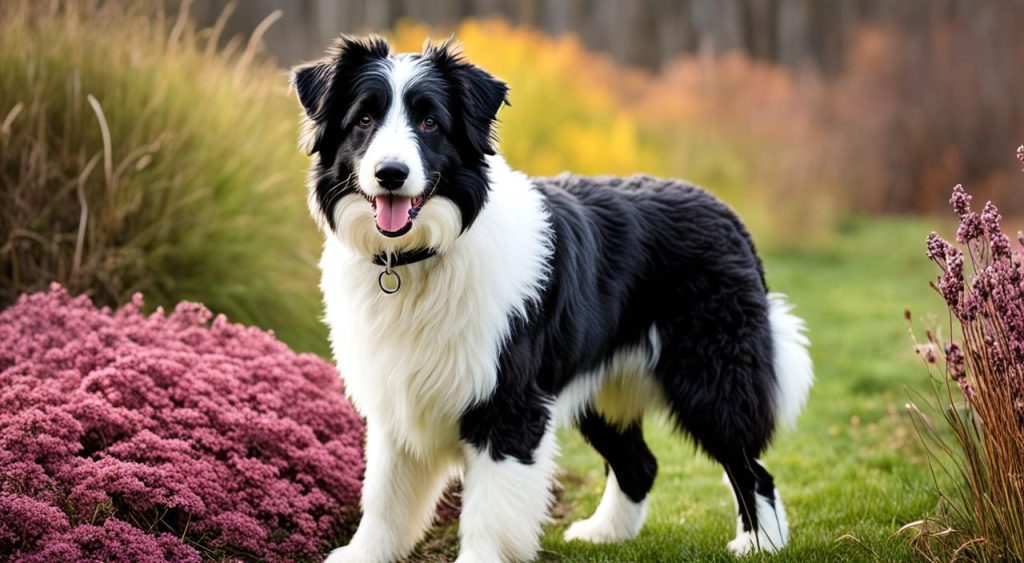
Temperament
Bordoodles are celebrated for their friendly, affectionate, and intelligent nature. They stand out as loyal companions, forming deep connections with their human families. Their calm and gentle demeanor makes them an excellent fit for families with children and other pets, cementing their status as ideal family pets.
These designer dogs are eager to please and respond positively to training, showcasing their friendly and obedient nature. They relish being part of family activities and adapt well to various living situations. However, their happiness depends on receiving adequate exercise and mental stimulation.
- Bordoodles are highly sensitive, alert, and energetic dogs.
- They are known for being intelligent, affectionate, and happy companions.
- Bordoodles have a loyal and gentle temperament, making them suitable for families with children.
The bordoodle temperament and bordoodle personality are shaped by the traits of their Border Collie and Poodle parents. This combination of bordoodle friendliness and bordoodle affection makes them a favored choice for those seeking a loving and adaptable family pet.
“Bordoodles are the perfect mix of intelligence, energy, and affection. They’re the ultimate companion dog.”
Health and Life Expectancy
Bordoodles, being mixed breeds, often face fewer health challenges than purebreds. Yet, they can inherit certain conditions from their parent breeds, such as hip dysplasia and progressive retinal atrophy. Ensuring proper breeding and health screenings can significantly reduce these risks.
On average, a Bordoodle’s lifespan is 12-15 years, surpassing many purebreds. Regular veterinary care and a healthy lifestyle are key to ensuring your Bordoodle enjoys a fulfilling life.
Common Health Concerns
Besides their generally robust health, Bordoodles may face specific health issues, including:
- Hip dysplasia
- Progressive retinal atrophy
- Epilepsy
- Elbow dysplasia
Adopting responsible breeding practices and early detection of these conditions can help manage and reduce their impact.
| Health Concern | Prevalence | Impact |
|---|---|---|
| Hip Dysplasia | Moderate | Can cause pain, lameness, and arthritis if left untreated |
| Progressive Retinal Atrophy | Low | Causes gradual vision loss and eventual blindness |
| Epilepsy | Low | Can be managed with medication, but requires lifelong treatment |
| Elbow Dysplasia | Moderate | Can cause pain, lameness, and arthritis if left untreated |
By remaining vigilant and collaborating with a veterinarian, Bordoodle owners can ensure their pets lead long, healthy, and vibrant lives.
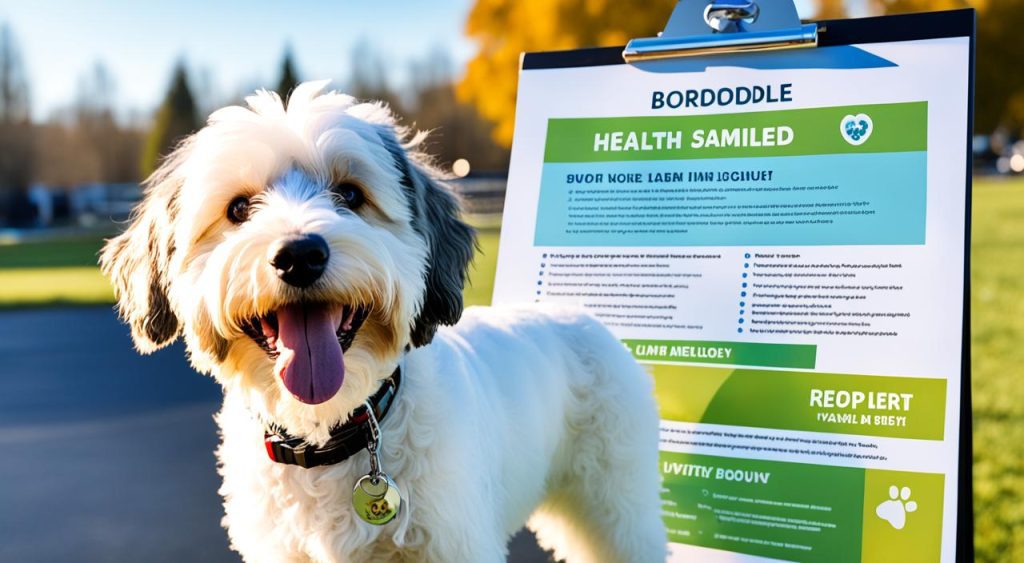
Caring for a Bordoodle
Owning a Bordoodle demands dedicated care and a commitment to their overall well-being. These intelligent, dynamic dogs have distinct needs in terms of bordoodle care, bordoodle grooming, bordoodle exercise, and bordoodle diet.
Exercise is paramount for Bordoodles. They need at least 45 minutes of daily activity, divided into two walks. Additionally, they benefit from mental stimulation through training, tricks, and dog sports. Ensuring they receive sufficient exercise and playtime is vital to prevent destructive behaviors and maintain their happiness and health.
Grooming is a vital part of Bordoodle care. Their medium-length, curly coats require regular brushing to avoid matting. It’s advisable to have professional grooming every 3-4 months to maintain their fur’s health and appearance.
A balanced, high-quality diet is crucial for Bordoodles. Owners must be cautious of portion sizes to prevent obesity, which can cause health problems. Consulting a veterinarian or pet nutritionist can aid in determining the appropriate bordoodle diet based on your pup’s size and activity level.
By focusing on their bordoodle care, including exercise, grooming, and diet, these dogs can flourish as cherished family members. Adhering to their specific needs ensures they lead a long, healthy, and joyful life.
“Caring for a Bordoodle is a labor of love, but the rewards are immeasurable. These versatile pups bring so much joy and energy to our lives.”
Training and Socialization
Bordoodles are intelligent and eager-to-please pups, making them relatively easy to train. Their trainability and enthusiasm for learning make them suitable for a range of activities, from obedience to agility. Proper bordoodle training and early bordoodle socialization are crucial to developing well-adjusted, well-behaved companions.
Effective Bordoodle Training
Bordoodles thrive with positive reinforcement training methods. They respond well to rewards-based techniques that keep training sessions fun and engaging. A professional bordoodle obedience training program, typically a 3-week course starting at 8 weeks of age, can help set the foundation for a well-trained Bordoodle.
During these training sessions, which occur twice daily for 30-45 minutes, the puppy receives the second round of vaccinations and de-worming. The training cost of $2,400 (with early enrollment) provides a $500 discount off the regular $2,900 fee. Trainers are certified by the center and many are also ADA certified to work with service dogs.
Crucial Bordoodle Socialization
Early and consistent bordoodle socialization is essential to prevent potential behavioral issues. Bordoodles that are properly socialized as puppies exhibit significantly fewer problems as adults. Desensitizing them to various stimuli can increase their knowledge, confidence, and ability to navigate the world stress-free.
Understanding a Bordoodle’s body language, such as tail wagging, lip licking, and yawning, can provide insights into their emotional state and communication needs. Positive socialization experiences that expose them to different people, animals, and environments will help Bordoodles develop into well-adjusted companions.
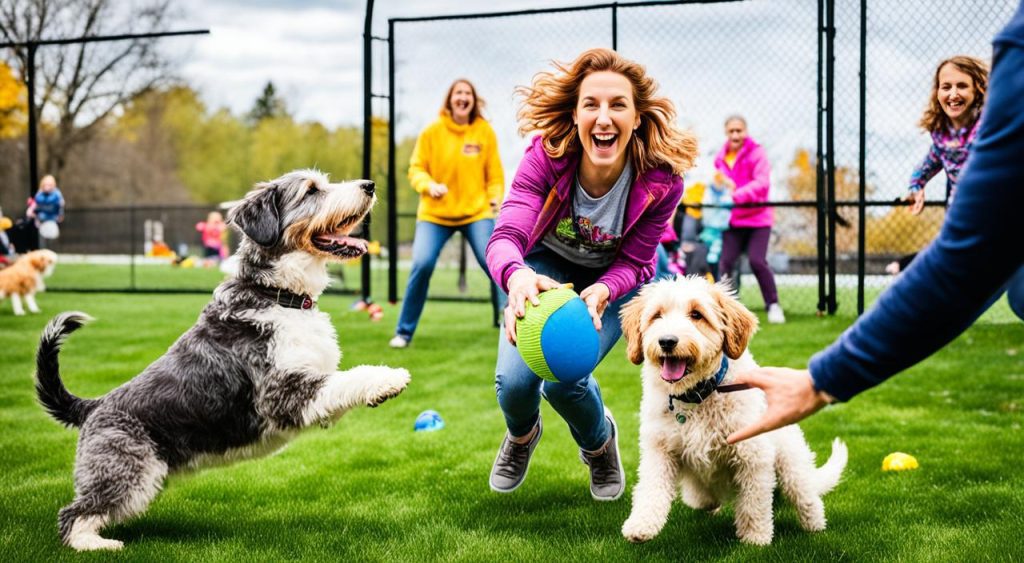
“Proper training and socialization are the keys to unlocking a Bordoodle’s full potential as a loyal, well-behaved companion.”
Bordoodles as Family Pets
Bordoodles excel as family pets, inheriting the best qualities from their Border Collie and Poodle parents. They are intelligent, loving, and adapt well to various living situations. Their gentle and playful nature makes them great with children, becoming loyal and engaging playmates.
These dogs are also excellent with other pets, thanks to early socialization. They can live peacefully with cats, dogs, and other animals in the family. Their high energy and enthusiasm make them keen participants in family activities and adventures.
Bordoodles weigh between 30 and 60 pounds and stand 16 to 22 inches tall at the shoulder. They have low-shedding, hypoallergenic coats in colors like cream, gold, red, chocolate, black, and apricot. Regular grooming is essential to prevent matting and keep their curly or wavy coat looking great.
| Trait | Rating |
|---|---|
| Shedding | 0 (no shedding) |
| Trainability | High |
| Temperament | 8 out of 10 |
| Personality | 9 out of 10 |
| Good with Kids | High |
| Grooming | 4 out of 10 |
| Energy Level | Moderate |
| Lifespan | 9 to 12 years |
Bordoodles need regular exercise, training, and socialization to flourish. Their intelligence and desire to please respond well to positive reinforcement, leading to well-behaved pets. With the right care, Bordoodles can fill their families with love, joy, and laughter.
“Bordoodles are the perfect blend of playful, intelligent, and affectionate – the ultimate family pet.”
Finding a Bordoodle
Bordoodles are a sought-after designer breed, available from reputable breeders or sometimes from shelters and adoption groups. It’s crucial to partner with an experienced, responsible breeder who checks for health and temperament. Prices for Bordoodle puppies range from $700 to $1,600, based on the breeder and the puppy’s specific traits.
Adopting a Bordoodle from breed-specific rescues or general shelters is also an option. These dogs may have a past that requires consideration but can become loving companions with proper care and training. Choosing a Bordoodle from a trusted source ensures you get a healthy, well-adjusted pet.
Regardless of whether you buy or adopt, thorough research is key. Reliable bordoodle breeders will be open about their breeding methods, health tests, and the dogs’ temperaments. They should also be ready to answer your questions and offer support after you welcome your new Bordoodle into your home. If you opt to buy a Bordoodle, be ready to dedicate time and effort to their care and training. This intelligent, energetic breed requires it.
FAQ
What is a Bordoodle?
Bordoodles are a cross between the Border Collie and Poodle. They are celebrated for their smarts, friendliness, and zest for life. This designer dog breed has become a favorite among pet owners.
What is the origin of the Bordoodle?
The origins of the Bordoodle are somewhat unclear, but their popularity has surged in recent decades. Experts suggest they emerged in the early 2000s in the United States, marking them as a relatively new crossbreed.
What are the physical characteristics of a Bordoodle?
Size, coat type, and color can vary in Bordoodles, influenced by their Border Collie and Poodle heritage. They often sport a medium-length, curly or wavy coat, reminiscent of a teddy bear. Males tend to be larger, weighing 50-60 pounds and standing about 22 inches tall. Females are slightly smaller, weighing 30-40 pounds and reaching 20 inches in height. Coat colors span from red and blue to dark brown, with some displaying bicolor or tricolor patterns.
What is the temperament of a Bordoodle?
Known for their warm, intelligent, and affectionate nature, Bordoodles make loyal companions. They bond deeply with their human families. Their calm demeanor makes them suitable with children and other pets.
What are the common health concerns for Bordoodles?
Generally, Bordoodles face fewer health issues than purebreds. Yet, they might inherit conditions like hip dysplasia and progressive retinal atrophy from their parents. Proper breeding and health checks can mitigate these risks. They typically live between 12-15 years, outliving many purebreds.
How should I care for a Bordoodle?
To care for a Bordoodle, ensure they get enough exercise, grooming, and a balanced diet. They need at least 45 minutes of activity daily, split into two sessions. Engage their minds with training and games. Their curly coats require regular brushing and clipping every 3-4 months. Feed them a high-quality diet appropriate for their size and activity level, avoiding overfeeding to prevent obesity.
How trainable are Bordoodles?
With their intelligence and desire to please, Bordoodles are relatively easy to train. They respond well to positive reinforcement and can learn various commands and tricks. Early socialization is key to preventing behavioral issues, as they can be cautious around strangers if not properly introduced.
Are Bordoodles good family pets?
Absolutely, Bordoodles are excellent family pets. They are gentle, loving, and excellent with children, often becoming playful companions. They generally get along with other pets, though early socialization is beneficial. Their energy and smarts make them eager to join in family activities, making them a valued part of the household.
Where can I find a Bordoodle?
You can find Bordoodles through reputable breeders or sometimes in shelters and adoption organizations. When looking for a Bordoodle, choose an experienced breeder who prioritizes health and temperament. Prices for Bordoodle puppies range from $700 to $1,600, based on the breeder and the puppy’s traits. Adopting a Bordoodle from a rescue or shelter is also an option.

